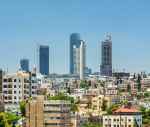You are here
What decides outcome of Syria peace talks
Apr 13,2016 - Last updated at Apr 13,2016
The two sides involved in the intra-Syrian peace talks resuming in Geneva this week are taking seriously the dictum “you don’t win at the peace table what you don’t win on the battlefield”.
Between this round and the last, the Syrian regular army, backed by Russian airpower and Hizbollah reinforcements, has retaken Palmyra and Al Qaryatain, both high-profile and strategic locations.
Remnants of the so-called “moderate” Free Syrian Army (FSA), backed by the US, have taken from the army the small towns of Al Eis, Al Khalidiya, Birna and Sitan, on the main highway linking Idlib province to Aleppo.
In this effort, the FSA has been backed by Ahrar Al Sham, the Jerusalem Army and other taqfiri groups, including Al Qaeda’s Jabhat Al Nusra, which is excluded from the ceasefire imposed on February 27, because it and Daesh are regarded as terrorist groups by the West, the Arabs and UN.
Determined to disrupt the ceasefire, Al Nusra has taken on Daesh and the Syrian army south of Aleppo, complicating not only developments on the battlefield but also the political situation for the FSA, backed by the US and Europe, which continues to fight alongside elements of Al Qaeda.
While vying for advantage in the intra-Syrian talks, Syrian parties to the conflict and their backers are aware that the outcome of the conflict and talks depends on whatever deal the US and Russia eventually make.
A Syrian source who has access to government and opposition, as well as Washington and Moscow, says that on the key issue of the presidency of Bashar Assad there is agreement that he must leave, but not yet when he must leave.
This means the situation remains essentially unstable and leaves room for battlefield gains and losses.
The war will continue, putting at risk the February 27 ceasefire.
Meanwhile, the negotiators who meet with UN mediator Staffan de Mistura will continue to stick to their positions on the main issue: transition to a new system of governance.
Having survived five years of armed struggle, the government is not ready to transform the system. Damascus’ aim is to perpetuate the rule of the Baath Party, and Assad and his allies.
The government calls for the formation of a “national unity Cabinet” which includes figures from the opposition, independents and civil society, amending the constitution, and holding elections for parliament and the president, with the proviso that Assad can stand if he chooses to do so.
Such a scenario is rejected by the High Negotiations Committee (HNC) and its backers in Riyadh and Ankara, the US and Europe.
They want a transition from the current regime to an as yet undefined “new” regime.
For Washington, in particular, “regime change” remains the primary objective. President Barack Obama proclaimed this objective on August 18, 2011, and has stuck to it, creating a political vacuum which has not been filled.
De Mistura has given the two sides a list of 29 questions, as well as his own statement of principles that are to be the first topics on his agenda.
His aim in this, the third round of Geneva III, is to progress to “substantive” negotiations on governance and the constitution.
Sawsan Zakzak of the Women’s Advisory Board formed during the first round said: “There have been no negotiations so far. The peace talks stage has not yet been reached. We have only the ceasefire... I am optimistic we can reach an agreement on a new government. If we don’t, World War III will start.
“People need more than a ceasefire. We have to finish with sieges, detentions and kidnappings. We need to [deal with] high prices [due to the fall in the value of the Syrian pound]. We need to start a political transition process, not a [transition] period. The choice of words is very important.”
She is upbeat.
“We have learned lessons from Iraq, Egypt, and Libya. And we have learned from Lebanon.”
By this, she meant that Syrians are well of the dangers of sectarianism and fundamentalism.
The Lebanese and Iraqi models of governments based on sects are not options for Syrians, she argued.
Instead of claiming that Washington and Moscow will decide Syria’s future, Zakzak insists that Syrians will decide “with the approval of Russia and the US”.
The Women’s Advisory Board has 12 members, six living in Syria, six outside, five of whom left Syria after the conflict began. They have, as the saying goes, “their ears to the ground”, and know how their countrymen and women feel and what they are thinking.
The women met with de Mistura a number of times and put forward both their proposals and strategies for implementing them.
Zakzak said the council’s current role is “to advise de Mistura and discover points of agreement between the sides. We are more than mediators because we are Syrians and we know the concerns and fears of both sides”.
Council members demand to be treated as a delegation equal to the HNC.
“De Mistura wants to bring in [representatives of] all Syrians,” Zakzak stated, including the Kurds who have been excluded due to opposition to their participation from Turkey.













